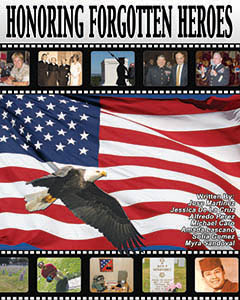
SERGEANT EDGAR HERNANDEZ
U.S. ARMY
In the dead of night in the Iraq desert of Nasiriyah, three days into Operation Iraqi Freedom, seven U.S. soldiers gathered together, joking with one another. Sadly, one of those soldiers would never return home.
“People were talking about dying,” remembered U.S. Army Specialist Edgar Hernandez. “Some of those same people who talked about dying were killed in combat.”
Born in McAllen, Texas on May 27, 1981, Edgar Hernandez was raised in Reynosa, Mexico but due to his United States citizenship, Hernandez’s mom wanted him to attend school in the U.S. Along with his younger sister and two brothers, they moved into a small room at his grandparents’ house in Alton, Texas and began attending an elementary school in Rio Grande Valley, which is a border town on the Gulf of Mexico.
The population in Rio Grande Valley was mostly Hispanic, however, the majority of people spoke Spanish and English. Hernandez believed he fell short, academically.
“It was hard for me because a lot of the kids who knew English assumed I did, too,” he stated. “I would get embarrassed because when they tried to talk to me in English, I had to tell them that I didn’t know the language. A lot of them didn’t want to associate with me because of that.”
With his father remaining behind in Reynosa to sell brooms and mops while trying to keep the money flow coming in, young Edgar struggled with the change. Although he lived in a tiny room that allowed zero privacy, this soldier-in-the-making felt lonely.
“I was really quiet and my teachers kept encouraging me to practice my English,” remembered Hernandez. “I was just so shy and while my friends spoke both English and Spanish, I did pick up on some of the words but I was still very bad at it.
“It wasn’t until I decided to join the Army that I really had to speak English. Even during all my high school years, I spoke Spanish with my friends.”
Enlisting in the Army was not an impulsive decision for Hernandez. Since a very young age, he was highly interested in the military. Hernandez clearly remembered watching the news in Mexico and seeing the latest updates on Desert Storm. Something about that particular war captured Hernandez’s attention at 10-years-old.
“After seeing Desert Storm on television,” explained Hernandez, “my brothers and I would play war.”
Even before Hernandez relocated to the United States permanently, he recalled telling his mother about his dream of joining the United States Army.
“No, you are not!” retorted his mother. “When you go to the U.S., you are going to go to college and get an education. You are not joining the military.”
Regardless of his mother’s reluctance, Hernandez held onto his dream. He took criminal justice classes during his junior and senior year of high school. After graduating, Hernandez studied for the ASVAV test and eventually passed.
Hernandez left for boot camp in January 2000. Describing boot camp as relatively easy, he learned how to shoot an M-16 and clean a weapon. He also threw a live grenade for the first time.

Life on the Army base had been a welcome reprieve of routine and stability for young Edgar Hernandez. That is until the morning of Tuesday, September 11, 2001, when 19 Al Qaeda affiliated terrorists boarded four commercial passenger jet airliners, which resulted in roughly 3,000 deaths—the World Trade Center collapsing, the Pentagon destruction and United Airlines Flight 93 crashing into a field.

“When September 11th came it was like a shock,” recalled Hernandez. “I was scared. I didn’t want to go to war.”
Two months later, the United States attacked Afghanistan for harboring members of the terrorist organization, Al Qaeda. Their time spent on the base became tension-filled as soldiers dealt with one recall after another.
“People were worried,” Hernandez noted, “especially the new people. The older soldiers told us not to worry, though, because we were going to be behind enemy lines. Our jobs are to shoot missiles from far away. So, it’s going to be safe.”
While going to Iraq was a strong possibility, Hernandez was confident that everything would be alright. “I did not feel as if we were in danger,” Hernandez stated. “I didn’t suspect we’d be actually going to war.”
On February 15, 2003, Hernandez got word that he would be going to the Middle East. Both he and his beloved friend Private Ruben Estrella Soto, who sadly passed away in Iraq, were on their way to a strange place where anything could happen.
Leaving El Paso, the soldiers were flown to New Jersey, then Frankfurt, Germany before finally reaching their destination.
Stationed in Kuwait City, Hernandez said, “Our daily routine would be to get up in the morning, run for two miles on the loose sand, shower, build secure barbed wire areas for all the parts, wait for more trucks and run missions.”
February rolled into March and most of the soldiers “hated being there.” They were homesick and bored.
Hernandez added: “We would say, ‘Man, if we are going to war, let’s get it over with.’”
One day, standing atop his Humvee manning a 50-caliber machine gun while on guard duty, Hernandez said, “It was weird because I noticed lots of planes taking off from the nearby airport towards Iraq. This went on for most of my guard duty.”
The next morning, March 20, 2003, the soldiers were informed the war had begun. “We heard back home they called this mission Shock And Awe and Operation Iraqi Freedom,” Hernandez recalled. “We were in Kuwait for about a month when the ground war had begun. We were supposed to be six hours behind the combat unit as we were part of the supply, and would be firing missiles from a distance.”

As a means to inspire the troops, the soldiers were told before the cameras of CNN and the rest of the world, “We are going to free Iraq!”
“I got nervous and said this is something big,” Hernandez explained. “Some people were saying, ‘Let’s go kick some butt.’ We hoped it wouldn’t last long.”
Preparing to battle the fourth largest Army in the world, Hernandez noted he was a bit apprehensive. “They had many soldiers but we had more equipment. I was a little scared but I was pumped up. The colonel mentioned, ‘This is a part of history.’”
On March 22, a group of 18 trucks not certain of their exact position made up a convoy. Driving down Highway 8, code-name Route Blue, Hernandez and his fellow soldiers could see the city lights as they approached a fork in the road. Now deserted, the terrain was earlier manned by U.S. troops to guide soldiers in the right direction. Without assistance, the convoy went the wrong way.
“We suddenly were passing a U.S. Marine battalion of tanks,” explained Hernandez. “They looked pretty cool. So, now some of us started asking, ‘Why are we passing these tanks?’ I never questioned that. To me, I thought they were just there.”
Close to 5am, the convoy approached the city of Nasiriyah as the commander was calling headquarters for directions. The countryside was very quiet with the exception of barking dogs. Driving underneath the bright blue sun, the convoy passed a military checkpoint.
“These were Iraqi guards and they had AK-47 assault rifles,” Hernandez said. “They were waving at us. This was weird. This was the enemy and here we were passing them.”
Soon, their trucks needed gas but they were clearly lost. “I remember seeing Iraqi men walking and others in vehicles passing by,” remembered Hernandez. “I noticed they were on cell phones and it turned out they were calling to plan the ambush.”
All of a sudden, First Sergeant Anthony Pierce (31), came down along the convoy telling everyone to “lock and load.” Only those with radios knew the convoy was in enemy territory and about to be attacked.
Hernandez said that he noticed more Iraqi soldiers walking by with AK-47 assault rifles. One tried to hide his weapon.
“Look, did you see that?’ Hernandez asked his crew.
As he watched his commander pick up speed in his Humvee, the back of his convoy “started taking fire.”
Trying to make a U-Turn and escape danger, Hernandez “saw a vehicle pull over with a lot of Iraqi soldiers in it.”
“I drove off really fast,” he said. “They got out and started shooting machine guns at the Army vehicles stuck behind me.”

Although he desperately tried to get away, Hernandez was captured by Iraqi soldiers as many of those around him died. Taken hostage, he was dragged from one prison to another, uncertain of his survival, wondering each moment if his time on earth was about to come to an end.
— Story by: Megan Rellahan
The entire grueling story of ex-POW, Edgar Hernandez is revealed in his autobiography titled;
Edgar Hernandez: An American Hero - download full PDF of entire book here, Download full PDF of Executive Summary here











|
|



CLICK HERE FOR TABLE OF CONTENTS

|
